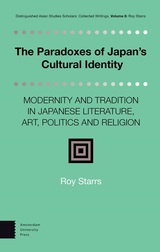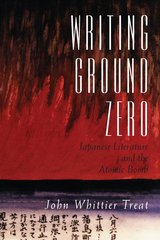3 books about Japanese Literature

The Paradoxes of Japan's Cultural Identity
Modernity and Tradition in Japanese Literature, Art, Politics and Religion
Roy Starrs
Amsterdam University Press, 2023
Japan is widely regarded as having a unique culture and a strong national identity. Paradoxically, however, many basic elements of Japanese culture are not originally Japanese. Since the beginning of its history, Japan has been one of the world’s major importers of foreign cultures. Its culture was thoroughly "hybrid" long before that word became fashionable in contemporary global studies. But this does not mean that Japan’s culture lacks originality. The Japanese have always made strikingly original contributions, even improvements, to whatever they imported. Even more significantly, the "hybridity" of their culture produced ongoing tensions that served as a kind of creative dynamo for Japanese writers, artists, and intellectuals. This book explores the fundamental creative tension between the native and the foreign in many areas of Japanese culture, from politics and religion to art and literature – a tension also often interpreted as between tradition and modernity.
[more]

Samurai with Telephones
Anachronism in Japanese Literature
Christopher Smith
University of Michigan Press, 2024
What is going on when a graphic novel has a twelfth-century samurai pick up a telephone to make a call, or a play has an ancient aristocrat teaching in a present-day schoolroom? Rather than regarding such anachronisms as errors, Samurai with Telephones develops a theory of how texts can use different types of anachronisms to challenge or rewrite history, play with history, or open history up to new possibilities. By applying this theoretical framework of anachronism to several Japanese literary and cultural works, author Christopher Smith demonstrates how different texts can use anachronism to open up history for a wide variety of different textual projects.
From the modern period, this volume examines literature by Mori Ōgai and Ōe Kenzaburō, manga by Tezuka Osamu, art by Murakami Takashi, and a variety of other pop cultural works. Turning to the Early Modern period (Edo period, 1600–1868), which produced a literature rich with playful anachronism, he also examines several Kabuki and Bunraku plays, kibyōshi comic books, and gōkan illustrated novels. In analyzing these works, he draws a distinction between anachronisms that attempt to hide their work on history and convincingly rewrite it and those conspicuous anachronisms that highlight and disrupt the construction of historical narratives.
From the modern period, this volume examines literature by Mori Ōgai and Ōe Kenzaburō, manga by Tezuka Osamu, art by Murakami Takashi, and a variety of other pop cultural works. Turning to the Early Modern period (Edo period, 1600–1868), which produced a literature rich with playful anachronism, he also examines several Kabuki and Bunraku plays, kibyōshi comic books, and gōkan illustrated novels. In analyzing these works, he draws a distinction between anachronisms that attempt to hide their work on history and convincingly rewrite it and those conspicuous anachronisms that highlight and disrupt the construction of historical narratives.
[more]

Writing Ground Zero
Japanese Literature and the Atomic Bomb
John Whittier Treat
University of Chicago Press, 1994
From Einstein and Truman to Sartre and Derrida, many have declared the atomic bombing of Hiroshima and Nagasaki to be decisive events in human history. None, however, have more acutely understood or perceptively critiqued the consequences of nuclear war than Japanese writers. In this first complete study of the nuclear theme in Japanese intellectual and artistic life, John Whittier Treat shows how much we have to learn from Japanese writers and artists about the substance and meaning of the nuclear age.
Treat recounts the controversial history of Japanese public discourse around Hiroshima and Nagasaki—a discourse alternatively celebrated and censored—from August 6, 1945, to the present day. He includes works from the earliest survivor writers, including Hara Tamiki and Ota Yoko, to such important Japanese intellectuals today as Oe Kenzaburo and Oda Makoto. Treat argues that the insights of Japanese writers into the lessons of modern atrocity share much in common with those of Holocaust writers in Europe and the practitioners of recent poststructuralist nuclear criticism in America. In chapters that take up writers as diverse as Hiroshima poets, Tokyo critics, and Nagasaki women novelists, he explores the implications of these works for critical, literary, and cultural theory.
Treat summarizes the Japanese contribution to such ongoing international debates as the crisis of modern ethics, the relationship of experience to memory, and the possibility of writing history. This Japanese perspective, Treat shows, both confirms and amends many of the assertions made in the West on the shift that the death camps and nuclear weapons have jointly signaled for the modern world and for the future.
Writing Ground Zero will be read not only by students of Japan, but by all readers concerned with the fate of culture after the fact of nuclear war in our time.
Treat recounts the controversial history of Japanese public discourse around Hiroshima and Nagasaki—a discourse alternatively celebrated and censored—from August 6, 1945, to the present day. He includes works from the earliest survivor writers, including Hara Tamiki and Ota Yoko, to such important Japanese intellectuals today as Oe Kenzaburo and Oda Makoto. Treat argues that the insights of Japanese writers into the lessons of modern atrocity share much in common with those of Holocaust writers in Europe and the practitioners of recent poststructuralist nuclear criticism in America. In chapters that take up writers as diverse as Hiroshima poets, Tokyo critics, and Nagasaki women novelists, he explores the implications of these works for critical, literary, and cultural theory.
Treat summarizes the Japanese contribution to such ongoing international debates as the crisis of modern ethics, the relationship of experience to memory, and the possibility of writing history. This Japanese perspective, Treat shows, both confirms and amends many of the assertions made in the West on the shift that the death camps and nuclear weapons have jointly signaled for the modern world and for the future.
Writing Ground Zero will be read not only by students of Japan, but by all readers concerned with the fate of culture after the fact of nuclear war in our time.
[more]
READERS
Browse our collection.
PUBLISHERS
See BiblioVault's publisher services.
STUDENT SERVICES
Files for college accessibility offices.
UChicago Accessibility Resources
home | accessibility | search | about | contact us
BiblioVault ® 2001 - 2024
The University of Chicago Press









